| |||||||||||||||||
| |||||||||||||||||
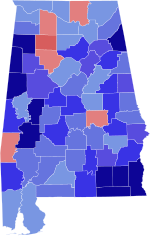 County results O'Neal: 50–60% 60–70% 70–80% 80–90% >90% Sheffield: 50–60% 60–70% | |||||||||||||||||
| |||||||||||||||||
The 1882 Alabama gubernatorial election took place on August 7, 1882, in order to elect the governor of Alabama.
| |||||||||||||||||
| |||||||||||||||||
 County results O'Neal: 50–60% 60–70% 70–80% 80–90% >90% Sheffield: 50–60% 60–70% | |||||||||||||||||
| |||||||||||||||||
| Elections in Alabama |
|---|
 |
The 1882 Alabama gubernatorial election took place on August 7, 1882, in order to elect the governor of Alabama.
| Party | Candidate | Votes | % | |
|---|---|---|---|---|
| Democratic | Edward A. O'Neal | 102,617 | 68.70 | |
| Republican | James L. Sheffield | 46,742 | 31.30 | |
| Other | Write-ins | 2 | >0.01 | |
| Total votes | 149,361 | 100.00 | ||
| Democratic hold | ||||

Opelika is a city in and the county seat of Lee County in the east-central part of the U.S. state of Alabama. It is a principal city of the Auburn-Opelika Metropolitan Area. As of the 2020 census, the population of Opelika is 30,995, an increase of 17.1 percent from the 2010 Census where the population was 26,477. The Auburn-Opelika, AL MSA with a population of 150,933, along with the Columbus, Georgia metropolitan area, comprises the Greater Columbus combined statistical area, a region home to 501,649 residents.

George Corley Wallace Jr. was the 45th governor of Alabama, serving from 1963 to 1967, again from 1971 to 1979, and finally from 1983 to 1987. He is remembered for his staunch segregationist and populist views; however, in the late 1970s, Wallace moderated his views on race, renouncing his support for segregation. During Wallace's tenure as governor of Alabama, he promoted "industrial development, low taxes, and trade schools." Wallace unsuccessfully sought the United States presidency as a Democratic Party candidate three times, and once as an American Independent Party candidate, carrying five states in the 1968 election. Wallace opposed desegregation and supported the policies of "Jim Crow" during the Civil Rights Movement, declaring in his infamous 1963 inaugural address that he stood for "segregation now, segregation tomorrow, segregation forever".

William Calvin Oates was a colonel in the Confederate States Army during the American Civil War, the 29th Governor of Alabama from 1894 to 1896, and a brigadier general in the U.S. Army during the Spanish–American War.

Emmet O'Neal was an American Democratic politician and lawyer who was the 34th Governor of Alabama from 1911 to 1915. He was a reformer in the progressive mold and is best known for securing the commission form of government for the cities of Alabama.
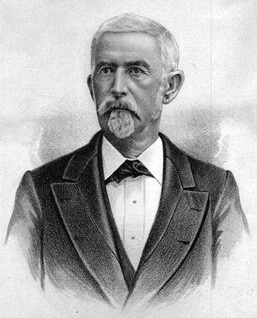
Edward Asbury O'Neal was a Confederate officer during the American Civil War and the 26th Governor of Alabama.

Rufus Willis Cobb was an American Democratic politician who was the 25th Governor of Alabama from 1878 to 1882. He is the only person to serve as both Governor of Alabama and Grand Master of the Grand Lodge of Alabama at the same time.
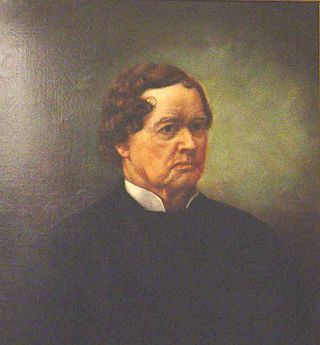
Reuben Chapman was an American lawyer and politician. He served six terms in the U.S. House of Representatives from 1835 to 1847, and as the 13th Governor of Alabama from 1847 to 1849.
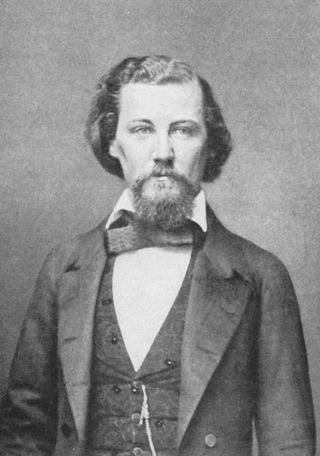
Clement Claiborne Clay, also known as C. C. Clay Jr., was a United States Senator (Democrat) from the state of Alabama from 1853 to 1861, and a Confederate States senator from Alabama from 1862 to 1864. His portrait appeared on the Confederate one-dollar note.

Dixie Bibb Graves was a first lady of the State of Alabama and the first woman to serve as a United States senator from Alabama. She was appointed to the Senate by her husband, Governor Bibb Graves, when Senator Hugo Black resigned in order to serve on the U.S. Supreme Court in August 1937. Graves was succeeded by fellow Democrat Lister Hill, who would serve for over 3 decades.

The Mobile and Ohio Railroad was a railroad in the Southern U.S. The M&O was chartered in January and February 1848 by the states of Alabama, Kentucky, Mississippi, and Tennessee. It was planned to span the distance between the seaport of Mobile, Alabama and the Ohio River near Cairo, Illinois. On September 13, 1940, it was merged with the Gulf, Mobile and Northern Railroad to form the Gulf, Mobile and Ohio Railroad.

Maple Hill Cemetery is the oldest and largest cemetery in Huntsville, Alabama, United States. Founded on two acres in about the year 1822, it now encompasses nearly 100 acres and contains over 80,000 burials. It was added to the Alabama Historical Commission's Historic Cemetery Register in 2008, and to the National Register of Historic Places in 2012. Its occupants include five governors of Alabama, five United States senators, and numerous other figures of local, state, and national note. It is located east of the Twickenham Historic District.

The lieutenant governor of Alabama is the president of the Alabama Senate, elected to serve a four-year term. The office was created in 1868, abolished in 1875, and recreated in 1901. According to the current constitution, should the governor be out of the state for more than 20 days, the lieutenant governor becomes acting governor, and if the governor dies, resigns or is removed from office, the lieutenant governor ascends to the governorship. Earlier constitutions said the powers of the governor devolved upon the successor, rather than them necessarily becoming governor, but the official listing includes these as full governors. The governor and lieutenant governor are not elected on the same ticket.
The Most Worshipful Grand Lodge of Free and Accepted Masons of the State of Alabama, commonly called the Grand Lodge of Alabama, is one of two Masonic grand lodges in the state of Alabama, the other being the predominantly African American Prince Hall Grand Lodge of Alabama.

Kay Ellen Ivey is an American politician who is the 54th governor of Alabama, serving since 2017. Originally a conservative Southern Democrat, Ivey became a member of the Republican Party in 2002. She was the 38th Alabama state treasurer from 2003 to 2011 and the 30th lieutenant governor of Alabama from 2011 to 2017.
Events from the year 1882 in the United States.

The 2018 Alabama gubernatorial election took place on November 6, 2018, to elect the governor of Alabama. Incumbent Governor Kay Ivey (R), who took office on April 10, 2017 upon the resignation of Robert Bentley (R), ran for election to a full term and won over Tuscaloosa mayor Walt Maddox. Ivey was sworn in for her first full term on January 14, 2019. This was the first time since 1966 that a woman was elected governor of Alabama.

The 2022 Alabama gubernatorial election took place on November 8, 2022, to elect the governor of Alabama. Incumbent Governor Kay Ivey took office on April 10, 2017, upon the resignation of Robert J. Bentley (R) and won a full term in 2018. In 2022, she won her bid for a second full term in a landslide.
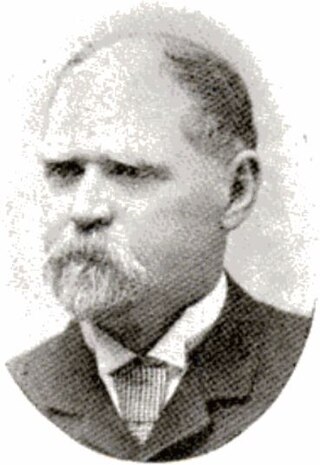
William Henry Sims was a lawyer, Confederate officer, and Democratic politician from Mississippi. He was the state's lieutenant governor from 1878 to 1882.

The 2022 Alabama lieutenant gubernatorial election was held on November 8, 2022, to elect the lieutenant governor of the state of Alabama. The election coincided with various other federal and state elections, including for Governor of Alabama. Primary elections were held on May 24, with runoffs scheduled for June 21 if a candidate failed to receive a majority of the vote.